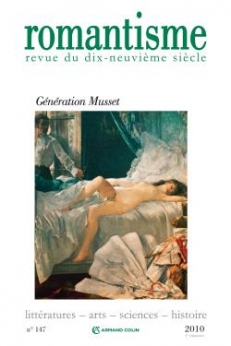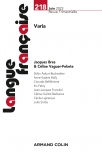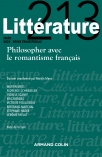
Romantisme n° 147 (1/2010)
Pour acheter ce numéro, contactez-nous
Recevez les numéros de l'année en cours et accédez à l'intégralité des articles en ligne.
L'histoire littéraire, en se concentrant sur le phénomène Jeune-France, sur le petit Cénacle, c'est-à-dire sur le plus visible et le plus exceptionnel, n'a peut-être pas rendu son vrai visage à l'ensemble de la génération 1830. En se concentrant sur les petites revues, cet article met en évidence une identité d'écrivain fabriquée à la confluence de la posture générationnelle et du support éditorial et fait émerger toute une population d'écrivains de vingt ans. Quelques années plus tard, beaucoup de ces écrivains ont fait carrière comme Emmanuel Gonzalès ou Eugène Labiche dans les ateliers du feuilleton et surtout du vaudeville.
By focusing on the Jeune-France phenomenon, on the « Petit Cénacle », which is to say on the most visible and the most exceptional, French literary history may not have fully rendered the features of the whole generation of 1830. This article focuses on the small journals of the time so as to bring to light a writer’s identity that emerges out of the encounter of the generational positioning and the material support of edition. Such a methodology brings to the foreground a whole new population of twenty-year-old writers. Many of these writers, such as Emmanuel Gonzalès or Eugène Labiche, later made a career in the workshops of the serialized novels and of the light comedy, mostly.

